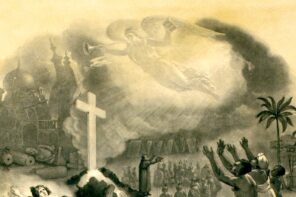You shall not give any of your children to offer them to Molech, and so profane the name of your God: I am the Lord.
-
- Leviticus 18:21
As a nation, we have to ask: When in God’s name are we going to stand up to the gun lobby? When in God’s name will we do what we all know in our gut needs to be done?
-
- President Joe Biden, 24 May 2002
In 1898, the French sociologists Henri Hubert and Marcel Mauss published a watershed piece in the study of religion, “Essay on the nature and function of sacrifice.” In it they looked at a variety of ancient sources—most importantly the Vedas and the Hebrew Bible—to try to discern the basic mechanism of sacrifice. Their analysis importantly diverged from the then-dominant theory that sacrifice was fundamentally about making some sort of offering to the gods. Rather, Mauss and Hubert hearkened back to the Latin etymology of the term sacrifice: sacer + facere, “to make [the] sacred.” In particular, they suggested that ritual did not placate or celebrate a pre-existing god, but instead created the god by placating or celebrating him.
As Ivan Strenski and others have shown, part of Hubert and Mauss’ project was intervening in the central political issue of their moment in France. The Dreyfus Affair pertained to the scapegoating of a Jewish military officer as a traitor but its discourse laid bare a constellation of much broader attitudes about sacrifice at the turn of the century in France. From a religious studies perspective, Hubert and Mauss’ essay was an important moment in the development of the theory of religion of their close colleague, Emile Durkheim, developed in the subsequent few years.
Examining Australian aboriginal religion, Durkheim argued, roughly: if the totem represents society, and the totem represents god, by transitive logic, society must be god. Durkheim’s theory holds, then, that religion is society’s self-worship—a fact that it obscures from itself through deploying various symbols (including gods and sacred objects). Durkheim’s theory centers on the question of how things are made sacred; his notion of sacrality revolves around an absolute, if arbitrary, difference between “sacred” and “profane.” As the etymology of sacrifice (again, sacer + facere) suggests, what we are willing and how we are willing to sacrifice relates to the gods (I use the term loosely) we make.
It is in this light that I think Garry Wills’ essay “Our Moloch,” written just after the Newtown murders nearly a decade ago, is best understood. He wrote,
That horror [of the Sandy Hook shootings] cannot be blamed just on one unhinged person. It was the sacrifice we as a culture made, and continually make, to our demonic god. We guarantee that crazed man after crazed man will have a flood of killing power readily supplied him. We have to make that offering, out of devotion to our Moloch, our god. The gun is our Moloch.
Moloch is a somewhat cryptic figure in the Hebrew Bible, associated first and foremost with child sacrifice. The foundational passage from Leviticus is as follows:
Whosoever he be of the children of Israel, or of the strangers that sojourn in Israel, that giveth of his seed unto Molech; he shall surely be put to death; the people of the land shall stone him with stones. I also will set My face against that man, and will cut him off from among his people, because he hath given of his seed unto Molech, to defile My sanctuary, and to profane My holy name… (Leviticus 20:2–5)
About mysterious Moloch (root: mlk) there are a variety of theories: perhaps it was the name of a now-obscure non-Israelite god; perhaps it was an alternative name for the Caananite god Baal; perhaps “Moloch” is not the name of a being but rather the name of a particular sacrificial ritual. Perhaps the Hebrew root comes from the notion of offering, from the notion of ruling, from the notion of promising. And quite outside of Moloch, child sacrifice is a biblical theme: Abraham’s willingness to kill Isaac at God’s command, Jephthah’s followed-through promise to sacrifice his daughter; and, in the New Testament, God’s salvific plan that hinges on the execution of his own son.
Regardless, Wills’ rhetorically powerful argument—that the gun is the ‘god’ to which the United States proves willing to sacrifice its children, over and over again—is, I think, best construed with an eye to Hubert’s and Mauss’ theory. It’s not that the god requires the deaths; it’s that the deaths create the god. The deaths we allow determine the god we are—one way or another—complicit in worshiping.
Perhaps more to the point, the perversity of the deaths—the perversity of child murder in elementary classrooms, or the murder of African Americans while selecting produce, or the mowing down of Jews worshiping in a synagogue or Sikhs in a gurdwara—underscores the perversion of the god they create. As Milton has it, “the children pass’d through fire/To his grim idol.”
Interestingly, as is evident from the Leviticus passages above, God’s objection to Moloch seems to be not primarily to the fact that Moloch’s worship involves the killing of children but rather to the fact that this is “profaning” to his name. Mere hours after the shooting, President Biden addressed the nation in a televised news conference. Visibly troubled, he spoke only briefly—his comments amounted to about seven minutes. Startlingly, he referred to God nine times in those seven minutes. These references did not seem to be overly theologically laden. He used the phrase “for God’s sake” three times and “in God’s name” four; in some forms of American English, these phrases are intensifiers. And there’s no doubt that the occasion called for intensity.
But I think—particularly considering his emphasis and repetition—we should take Biden’s rhetoric as more than mere flourish. If we do, a different picture emerges. Biden appeals to the name of God because his Bible instructs that the name of the Biblical God is profaned when adults sacrifice children.
By the logic of Hubert and Mauss, Americans’ ongoing willingness to see children slaughtered constructs a twisted and perverse god—what the writers of the Hebrew Bible would consider a false god, an idol. By persisting in their claims, absolute gun-rights defenders are elevating the god sustained by children’s blood over an alternative god. That alternative god—one who is disgusted by child sacrifice—is the god whose “sake” Biden invokes.
If you’re inclined to look for a god, imagine an alternative god who is incensed by, rather than satisfied by, the gun deaths of children at school: which god do you prefer?
If you’re not inclined to look for a god, understand what Hubert and Mauss are teaching us: the way we sacrifice and whom we sacrifice tells us about the society we’ve made, what it values, and what it protects.





